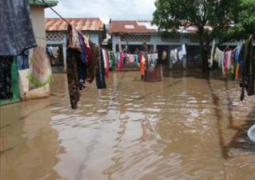Over the years tens of thousands of our youths in Africa have been risking their dear lives to enter Europe via the back-way.
While some are eventually entering Europe to reside in countries like Spain, Italy, Greece, Germany and other places, under harrowing and dehumanizing condition, lots of them are dying en route to Europe in the desert of North Africa and the Mediterranean Sea.
Countless number of strategies, sensitization campaigns, international and national projects and huge amounts of financial resources have been put in place, or are being rolled out to curb the illegal migration menace of our youths to European countries.
It seems all these resources being invested in the fight to curtail the illegal or back-way travel to Europe through the diabolical sea route is like throwing water on sand, with no fruitful results, as the youths have continued in desperate spirit to penetrate Europe through the back-way.
Commenting on the back-way syndrome, Spain’s current Chargé d’Affaires to The Gambia said the general trend of going to Europe illegally, which involves youths from The Gambia and neighbouring countries, is a serious cause for concern to which a solution of concerted efforts is needed.
Her concern is also substantiated by the latest report on illegal immigration put out by the International Organization for Migration (IOM), on arrivals of migrants to Italy in the first weeks of 2016, as arrivals “have come mainly from sub-Saharan Africa, especially Nigeria and The Gambia”.
“Nigerians and Gambians accounted for around one third of the 5,273 migrants who arrived in Italy during January 2016,” the report stated.
It added that The Gambia is one of the countries in Africa where many immigrants are leaving for Europe.
From January to March 2015, about 51 immigrants left The Gambia for Italy; and in the same period between January and March 2016 about 676 people travelled through the back-way to Italy from The Gambia, the report stated.
Whilst some immigrants are making it to Europe, others are losing their lives in droves on the way to the continent with ‘milk and honey’.
The IOM report stated that an estimated figure of 444 immigrants have so far lost their lives this year – in less than three months!
But why has this trend continued unabated?
Much of the problems and miserable situations we are faced with today in Africa are perpetuated by abject poverty in African countries and bad governance such as misplaced and wrong economic policies, corruption and embezzlement of state resources, human rights violations, and power struggles and conflicts.
In the case of The Gambia, we can also draw some lessons from the salient remarks made last week by the US ambassador to The Gambia, that youth entrepreneurship is even more necessary in the face of the current rising unemployment in sub-Saharan countries, which has continued to sadly force many of the continent’s able-bodied youths to take risky ventures in search for better lives in Europe.
“It is, therefore, critical not only that the overall business climate improves, but that we motivate, inspire, and capacitate youths…,” the US ambassador said. “Young people represent today’s generation as well as the future, and it is our collective responsibility to empower them now with relevant skills that will leverage economic stability in the foreseeable future.
“Young people have lots of ideas, but too often find it difficult to take those first important steps. It’s hard for them to access capital and hard to find the training and the skills they need to translate their ideas into professional practice.”
If thorough consideration is given to the youths as emphasized by the US ambassador, together with support from such countries as Spain and international partners as the EU, a lot more could be done to help them to be more industrious at home and contribute to transform Africa for the better.
“It is our collective responsibility to empower the youth’’
Ambassador Patricia Alsup
Read Other Articles In Article (Archive)

Bai Babu makes history as “fahass” video hits a million views
Oct 21, 2016, 10:05 AM
Sang Marie Is Here!
Aug 13, 2008, 7:09 AM


